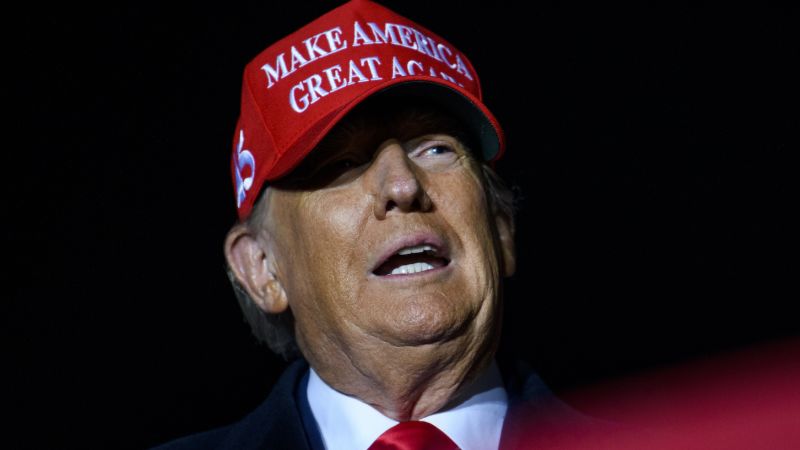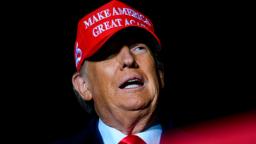

CNN
—
The former president sometimes called “Teflon Don” is learning that sometimes, the subpoenas do stick.
In recent months, former President Donald Trump and his allies have suffered a string of defeats in court as they’ve tried to resist or impede criminal investigations into his conduct.
The latest example was Trump’s unsuccessful bid to block testimony from his former White House lawyers before the federal grand jury investigating 2020 election subversion. The attorneys, Pat Cipollone and Pat Philbin, appeared before the DC-based grand jury on Friday.
The night before, a federal appeals court tossed out the special master review that was holding up parts of the criminal probe into government documents that were taken from his White House to Mar-a-Lago.
The Trump-world losing streak reflects the deference that courts tend to give to criminal investigations – particularly when the probes that have not yet brought charges. Courts have shown far less tolerance for legal delay tactics in cases concerning criminal probes.
In its opinion, the 11th US Circuit Court of Appeals touted the “case law limiting the federal courts’ involvement in criminal investigations” while deriding “needless judicial intrusion into the course of criminal investigations – a sphere of power committed to the executive branch.”
The pace of the litigation has been in contrast to how judges allowed Trump to use the legal process to hold up congressional investigations and throw wrenches in the civil lawsuits he faces.
“The criminal investigation does tend to trump most things when it is active and going on,” said Shan Wu, a criminal defense attorney and former prosecutor. “The purpose of judicial review is to look later to see, was something done wrong here, was something unfair. You don’t put in the judicial review right in the middle of them doing investigation.”
Trump and his inner circle are also fending off an Atlanta-area investigation being run out of a special purpose grand jury looking at the election subversion gambits that targeted Georgia in 2020.
In that investigation, which is being spearheaded by Fulton County District Attorney Fani Willis, several Trump allies have sought to evade subpoenas demanding that they appear before the grand jury. With very little exception,the attempts by those in the MAGA galaxy to avoid appearing have been unsuccessful.
Michael Flynn, who served as national security adviser in Trump’s White House, is the latest witness to strike out in a court battle to block enforcement of a Fulton County subpoena. A Florida judge on Thursday refused to delay Flynn’s testimony while Flynn appeals the order commanding his appearance.
Previously, the South Carolina State Supreme Court said that Mark Meadows must appear before the grand jury testimony, and a state court in Colorado this summer compelled the appearance of ex-Trump campaign legal adviser Jenna Ellis.
Many of the disputes over the subpoenas are playing out in state courts across the country based on where the witnesses in question now reside. Those courts often made the determination that the witnesses are “necessary and material” to the investigation, while pointing to the approvals the subpoenas got from the judge in Georgia who is supervising the Fulton County grand jury.
“There’s a very old, going back to England, common law rule that grand juries entitled every person’s evidence,” said Randall Eliason, a former DOJ prosecutor who now teaches at George Washington University Law School.
“There’s a real strong presumption that because they’re investigating crimes and crimes are… the most serious things we look at, a grand jury is entitled to hear from everybody,” Eliason said. “You need a pretty high threshold to resist testifying in a grand jury or to resist turning over information.”
Sen. Lindsey Graham sued in federal court to halt a subpoena in the probe, arguing his testimony was shielded by the Constitution’s Speech or Debate Clause, which protects certain legislative activity by lawmakers. The litigation delayed his testimony for several months, but the South Carolina Republican ultimately lost – including at the Supreme Court – in his efforts to blow off the subpoena altogether. The federal litigation that Rep. Jody Hice brought to quash a subpoena was unsuccessful as well.
The Trump efforts to block testimony sought by the federal grand jury in the Justice Department’s January 6 probe also have appeared to have fallen short, as they unfolded in highly secretive proceedings that have obscured the legal claims the former president has made.
Chief Judge Beryl Howell of the DC District Court, who oversees the federal grand juries in Washington, recently rejected Trump’s bid to shield Cipollone and Philbin from answering certain questions the former president claimed were covered by privilege.
The Justice Department was able to secure their testimony after defeating a previous Trump gambit – also litigated in secret – to block advisers to former Vice President Mike Pence from having to answer questions he said were shielded by privilege.
While he was in the White House, Trump had a better track record in court battles that stymied investigations.
His legal challenges to congressional demands for information stalled those probes for years, with much of the litigation outlasting his presidency. A four-year court battle over the IRS turning over his tax returns to the House concluded only last month with the Supreme Court refusing to block the production.
To some extent, Trump was also able to, as president, use those delay tactics to hamper the criminal probes encircling him. Manhattan District Attorney Cy Vance had to wait a year to get compliance with a subpoena issued to Trump’s accounting firm for his tax returns after Trump’s challenge to the subpoena was taken up by the Supreme Court.
But even then, the courts’ deference to criminal investigations was evident. The Supreme Court treated a similar subpoena issued by House lawmakers with far more skepticism than how it viewed the Vance probe subpoena, with a ruling that said “two centuries of experience confirm that a properly tailored criminal subpoena will not normally hamper the performance of the President’s constitutional duties.”
Now that he is no longer president, courts are moving even more quickly to resolve the disputes he and his allies are raising – and the Supreme Court has shown no inclination to get involved.
In addition to its refusal to get in the way of Graham’s appearance before the Fulton County grand jury, the Supreme Court has rejected requests by Trump that it interfere with the House’s demands for records from his White House for the January 6 probe.
Additionally, the justices refused to reinstate the special master review of the documents marked as classified that were seized in the FBI’s Mar-a-Lago search. Trump brought the matter before the Supreme Court again after an appeals court granted a DOJ request to carve those documents out of the special master process and let the criminal probe into them continue.
Now Trump attorneys are weighing whether to turn to the Supreme Court to revive the special master review of the materials the FBI obtained in the search of his Florida home. Not only are claims of executive privilege weaker now that Trump is no longer president, he is facing a higher bar in asking the court to wade into in an investigation being run the executive branch, as opposed to when the dispute was between him and Congress.
“You can’t really argue separation of powers when it comes to a grand jury because that’s also the executive branch,” Eliason said. “So it’s the executive branch looking at its own stuff.”
